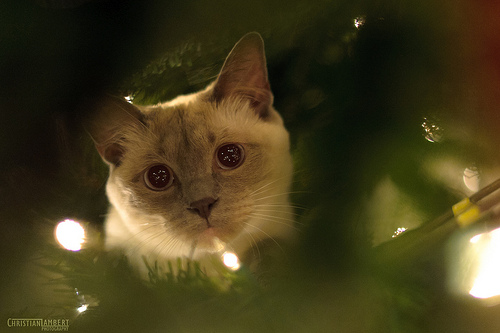First, I’d like to say Happy Holidays & Seasons Greetings to anyone and everyone celebrating anything this time of year!
As the air fills with the scent of fresh cut pine, apple cider and cheer our pets need to be remembered, make the holidays safe for our critters. This is probably especially important since with the wintery weather they are spending more time inside where it’s toasty, they could get up to more mischief than usual.
- The beautiful Christmas flower, the Poinsettia, is considered mildly toxic to irritating. If ingested, can cause nausea of vomiting. If the milky white sap comes in contact with skin, it can cause itching, redness and swelling.According to http://www.petpoisonhelpline.com/ there is no treatment necessary.
- Another common traditional holiday plant is the Mistletoe, often hung in doorways for stealing kisses, even stealing from the furry family members. It is considered mild to moderately toxic.There are 2 different types of this yuletide plant, the American variety (Phoradendron serotinum) and the European variety (Viscum album). The American variety is less toxic. Signs of toxicity may be gastrointestinal irritation such as drooling, vomiting, diarrhea and stomach pain. When ingested in large quantities other signs will include abnormal heart rate, collapse, low blood pressure, uncoordinated walking (ataxia), seizures and death have been reported.To be safe, keep the mistletoe out of reach of pets, or better yet – opt for a plastic look alike.If ingestion is suspected, contact a veterinarian immediately.
 The holiday season wouldn’t be complete with out Holly and berries. This common Christmas plant is considered mild to moderate toxicity. When ingested, English holly, also known as Christmas holly, can result in severe gastrointestinal upset such as vomiting or diarrhea. The spines on the leaves will also cause a pet to smack their lips, drool, and shake their head from injury. The other species of holly, Japanese & Chinese, are similarly toxic and will display similar side effects. If ingested, it’s best to contact your veterinarian for further instruction.
The holiday season wouldn’t be complete with out Holly and berries. This common Christmas plant is considered mild to moderate toxicity. When ingested, English holly, also known as Christmas holly, can result in severe gastrointestinal upset such as vomiting or diarrhea. The spines on the leaves will also cause a pet to smack their lips, drool, and shake their head from injury. The other species of holly, Japanese & Chinese, are similarly toxic and will display similar side effects. If ingested, it’s best to contact your veterinarian for further instruction.- If your family is one of the millions of households who choose to bring a live conifer, Christmas trees, inside for the season, be aware that the oils from the tree can cause irritation to the mouth and stomach. Common signs are excessive drooling and vomiting. The needles of the tree are also not easily passed or digested, they can cause irritation of the gut, vomiting, and even obstruction or puncture. Normally pets won’t eat the tree though.
- The Amaryllis is also a popular holiday plant often given as a gift this time of year. It is a member of the lily family and is considered very toxic to cats. Severe symptoms of toxin can include cardiac arrhythmia, kidney failure, convulsions and even death.
- Narcissus, and other members of the daffodil family are also given as gifts. These flowers are poisonous to both dogs and cats, especially the bulbs.
Keep your pets in mind this season & stay safe!
Happy Holidays!
photo credit: Merry Christmas to All - from Otis and Rick via photopin (license) photo credit: Kitteh in a Tree via photopin (license)
